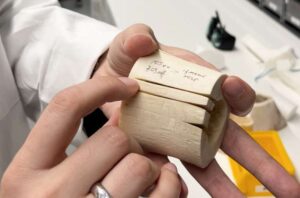MedTech News
.................... by Andrew Celentano

New record: Laser for surgery cuts bone deeper than before
Lasers cut precisely and without contact—ideal for surgery. The problem is that in hard tissues such as bone, they are too slow and do not cut deep enough. Researchers at the University of Basel have now demonstrated a way to cut much deeper and faster with a surgical laser than with previous laser systems.

Synergy Spine Solutions® Receives FDA Approval for its Synergy Disc®, Expanding Cervical Disc Replacement Options for U.S. Patients
Synergy Spine Solutions®, a medical device company focused on improving the quality of life for patients undergoing spine surgery, today announced it has received U.S. Food and Drug Administration (FDA) Premarket Approval (PMA) for the Synergy Disc® for 1-level indications at C3-C7.

Engineered protein markers read living brain gene activity in monkeys via blood
Gene therapy has been successfully used to treat a number of diseases, including immune deficiencies, hereditary blindness, hemophilia and, recently, Huntington’s disease, a fatal neurological disorder.

AI accurately spots medical disorder from privacy-conscious hand images
An AI can accurately diagnose a rare endocrinological condition just by analyzing pictures of the back of the hand and the clenched fist. The privacy-conscious achievement by Kobe University holds promise for establishing more efficient referral systems and reducing health care disparities across communities.

Boehringer Wins Speedy Lung Cancer Approval Under Commissioner’s Priority Program
Hernexeos is the second drug to secure an FDA approval under the agency’s priority voucher scheme, following in the footsteps of USAntibiotics’ Augmentin XR, which was granted the ticket in December 2025.

DeepHealth Achieves CE Mark for TechLive and Enables AWS Marketplace Deployment
TechLive is a multimodality, vendor-agnostic remote scanning and radiology management solution extending expert oversight across multiple modalities

Abbott earns FDA green light for next-gen CardioMEMS pulmonary artery pressure reader
Abbott (NYSE: ABT)+ today the FDA approved its CardioMEMS Hero next-generation pulmonary artery (PA) pressure reader.

Optellum Secures TGA Approval to Expand AI-Enabled Lung Nodule Solution To Australia
OXFORD, England, Feb. 26, 2026 /PRNewswire/ — Optellum, the leading AI-enabled solution for earlier lung cancer detection, is thrilled to announce that it has received Therapeutic Goods Administration (TGA) class IIb approval in Australia for the Virtual Nodule Clinic (VNC) platform to support early lung cancer diagnosis.
